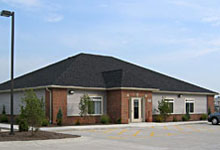Retinal detachment is a serious condition that should always be treated as an emergency. Without quick intervention, permanent vision loss is possible. In the worst-case scenario, when left untreated, it can even cause blindness in the affected eye.
By recognizing the signs of retinal detachment, you can take immediate action if you experience the symptoms. Here’s a look at what the condition is, who is at risk, and the symptoms that can occur.
What is Retinal Detachment?
A retinal detachment is a condition where the retina – a thin layer of tissue at the back of the eye – pulls out of its normal position. Retinal cells end up moving away from blood vessels, reducing or cutting off their access to nutrients and oxygen. As time passes, these cells get damaged and die off, resulting in potentially permanent vision loss.
Who’s at Risk of Retinal Detachment?
Technically, everyone is at risk of retinal detachment simply because they have a retina. However, certain segments of the population are more likely to develop the condition, including individuals with:
- Severe nearsightedness
- Previous eye injury
- Previous cataract surgery
- Diabetic retinopathy
- Lattice degeneration
- Posterior vitreous detachment
- A family history of retinal detachment
What Are the Symptoms of Retinal Detachment?
While a retinal detachment sounds like it would be painful, it isn’t. Usually, those affected don’t feel anything happening at all. As a result, identifying the warning signs of a retinal detachment in progress is critical.
Some of the symptoms of retinal detachment include:
- Blurred vision
- Flashes of light
- Reduced peripheral vision
- Shadow or “curtain” over your field of vision
- Sudden, significant increase in the number of floaters (small specks that appear to float across your field of vision)
- Changes in visual perception, typically straight lines starting to appear curved
What to Do If You Suspect a Retinal Detachment
If you are experiencing any of the symptoms associated with a retinal detachment, seek medical help immediately. A retinal detachment is an emergency, and any delay could increase your chances of severe and irreversible damage or blindness. The faster you act, the more likely the detachment can be halted or repaired, preserving or restoring your vision.
Once you arrive at your ophthalmologist’s office, they will examine your eyes with special instruments to look for retinal detachment. If they find evidence one is occurring, they may recommend several treatments approaches, including:
- Thermal or Cryopexy Repair
- Pneumatic Retinopexy
- Scleral Buckle
- Vitrectomy
It’s important to understand that retinal detachments won’t repair on their own. Action by a medical professional is required if you want to preserve or restore your vision. With quick action, retina procedures are predominately successful. However, it could take time for your vision to return, and, in severe retinal detachment cases, some of the damage may be permanent.
If you believe you are experiencing retinal detachment, contact your ophthalmologist immediately. Additionally, make sure to attend your regular eye care appointments, ensuring your eye doctor can look for signs of retinal detachment or other conditions that may be going unnoticed. If you haven’t visited your eye care specialist recently, schedule an appointment at your closest ECVA clinic today.







